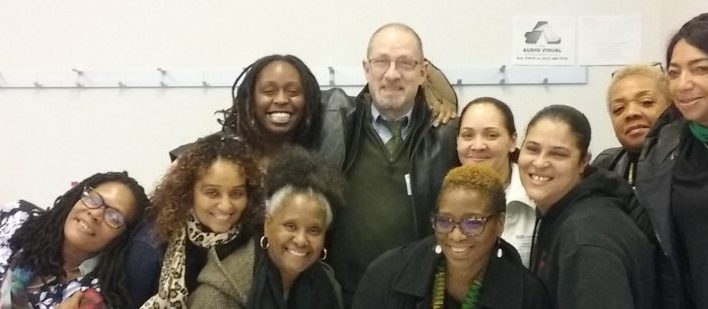Interview with a policy maker: ‘More about preserving families than separating families’

Mike Arsham (above, centre) is the director of advocacy at New York City Administration for Children’s Services. In 2004-05, while working with the Child Welfare Organizing Project (CWOP), he collaborated with ATD Fourth World International on the research for How Poverty Separates Parents and Children: A Challenge to Human Rights, a study funded by the United Nations and with a foreword by UNICEF. Below, he is interviewed by Taliah Drayak, a member of ATD UK, and director of the International Parent Advocacy Network, which produced this Toolkit for Transformation with contributions from Mike.
Meaningful alternatives
Taliah: Do you feel working with parents with experience of child welfare can make a real difference?
Mike: By any objective measure, it has made a huge difference in New York City. I am not saying it was CWOP alone or it was parents alone who brought about some of the changes that we’ve seen in the system over the past twenty years. But nobody can say that they didn’t contribute significantly because just about all of our targets for system change have become realities in that period of time.
The foster care census has dropped dramatically. We had about 50,000 New York City children in foster care in the late ’80s and early ’90s. It’s less than 8,000 now. Far and away the largest cohort of children and families served by this agency [the Administration for Children’s Services] is in preventive services.
I am not saying preventive services are perfect or that they are Nirvana; but one of our goals was that the function of the child welfare agency, the public agency should be more about preserving families than separating families. To a large extent that goal has been achieved.
I’m not saying “mission accomplished”. There are still families that are separated unnecessarily; but a lot less than in years past. We have meaningful alternatives to offer instead of involuntary removal of their children.
Quality legal representation
The quality of legal representation for parents in New York City has changed dramatically in that time. When I first started at CWOP, parents had these court-appointed attorneys they were called 18Bs. (That was the state statute that authorised hiring them.) Every parent who came to CWOP represented by an 18B told us the same story:
“My lawyer doesn’t know my name. My lawyer doesn’t return my phone calls. My lawyer doesn’t have a phone. The only time I see my lawyer is in court, and then only in the waiting area where they usually tell me ‘just make an admission if you ever want to see your kids again’, even if I’m saying to him that I don’t think the allegations are true and I have evidence that you could use to rebut them.”
You had attorneys who just wouldn’t make a motion on a parent’s behalf in court because they would get paid the same win, lose or draw. Now however we have these institutional legal service providers where it’s a team of an attorney, a social worker and a parent advocate. CWOP takes credit for that third thing: we were the ones who lobbied the city agency that funds these services, saying that the model had to include a parent advocate.
Parents are served best by somebody who looks like them and lives like them, who knows their community, who knows their issues, who has walked in their shoes. We didn’t want to be represented by attorneys who were infantilising and disempowering and would say: “just sit there and let me do all the talking”. That’s not effective advocacy.
An agency led by those it’s meant to serve
Taliah: If you could make one next step in child welfare happen right now what by that be?
Mike: I do think there is a need for a public child welfare agency, but I think it needs to be more conceived of, and staffed by, and led by the people it exists to serve and the communities that it exists to serve. It needs to provide the kind of services that more affluent people can access easily and take for granted.
That’s really kind of the dichotomy that we often see. If I have material wealth and I’m connected to people in power, I can enter the Betty Ford Clinic; I can hire a nanny; I can send a child to boarding school; I can access quality psychiatric care.
I think that those are the things that need to be more accessible to people with less, money, power and influence. One way to do that is to put people with that kind of life experience in charge of public agencies.
The excerpts above have been transcribed from this video interview.
In this related article, members of ATD Fourth World give other examples of positive forms of advocacy for families interacting with Children’s Social Care.

